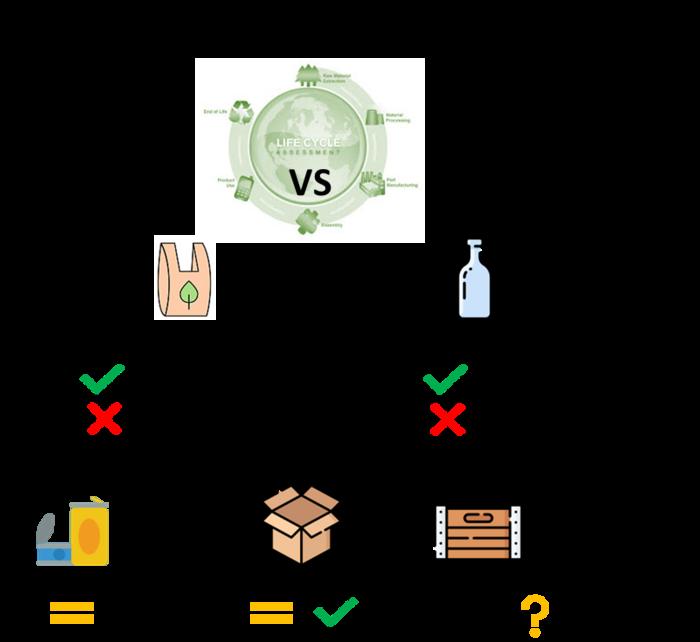Milan, 16 May 2024 –. The increasing sense of environmental responsibility of both consumers and companies has triggered a transition towards alternative materials which are perceived as more sustainable than plastics. A new study conducted by the AWARE (Assessment on WAste and REsources) research group of Politecnico di Milano, recently published in the renowned journal’Waste Management & Research: The Journal for a Sustainable Circular Economy’, examines the real sustainability of these materials. The research analysed 53 peer-reviewed Life Cycle Assessment (LCA) studies published in 2019-2023. The aim was to gain in-depth understanding of the environmental impacts of packaging, focusing on the comparison between plastics and alternative materials.

Credit: Polimi
Milan, 16 May 2024 –. The increasing sense of environmental responsibility of both consumers and companies has triggered a transition towards alternative materials which are perceived as more sustainable than plastics. A new study conducted by the AWARE (Assessment on WAste and REsources) research group of Politecnico di Milano, recently published in the renowned journal’Waste Management & Research: The Journal for a Sustainable Circular Economy’, examines the real sustainability of these materials. The research analysed 53 peer-reviewed Life Cycle Assessment (LCA) studies published in 2019-2023. The aim was to gain in-depth understanding of the environmental impacts of packaging, focusing on the comparison between plastics and alternative materials.
In the contemporary business landscape, plastic packaging continues to play a crucial role in several sectors, especially in the food industry, where it accounts for more than half of total sales.
Contrary to common perceptions, the study revealed that conventional plastics are not always the least environmentally friendly choice. Bioplastics, in particular, emerge as a viable alternative in terms of climate change and depletion of fossil resources. However, other environmental impact categories show some disadvantages, indicating that there is no one-size-fits-all solution.
Furthermore, the use of glass, although it may seem more sustainable, entails challenges related to its weight, which affects glass performance not only in the production but also in the transport phase. Although the reuse of glass is an environmental improvement, it must be done under specific conditions to make reused glass more advantageous than conventional plastics.
For metals, such as aluminium, the comparison with plastics is more balanced, especially in the beverage sector. However, even here there are opportunities for improvement, such as focusing on reuse and limiting the transport distances and environmental loads associated with the reprocessing and washing of packaging.
The analysis of the LCA studies also identified areas for improvement for all materials examined. Glass and metals may benefit from increased reuse, while bioplastics require optimisation in production processes and end-of-life management.
It is important to emphasise that a comprehensive assessment of the sustainability of packaging also requires an analysis of social and economic impacts. Only by considering the entire life cycle can we fully understand the implications of each packaging choice.
“Two fundamental aspects emerge from the more than 50 studies analysed. – Giovanni Dolci, AWARE group researcher, explains – First of all, the choice between plastics and alternative materials is highly dependent on the specific application as well as the intrinsic characteristics of the material. At the same time, many studies show methodological criticalities that may influence the results of the comparison, such as analysing only climate change effects without assessing other potential impacts or analysing unrealistic end-of-life packaging management scenarios”.
“Plastics proves to be a material with excellent environmental performance, provided it is used correctly; this is due to its light weight, which allows for minimal use of material per package unit and optimising of production processes compared to younger materials such as bioplastics. However, we should not forget the two main criticalities, that is, production from fossil resources and, above all, the high propensity to dispersion of plastics in the environment, where it takes a very long time to degrade; the latter aspect is generally not included in assessments such as those analysed in the research”, Mario Grosso, professor of Waste Management, points out.
In conclusion, while scientific research offers valuable information on which materials may be more sustainable, it is crucial to carefully consider all aspects involved in the choice of packaging, from production to reuse and recycling, for a more sustainable future for us all.
Journal
Waste Management & Research The Journal for a Sustainable Circular Economy
DOI
10.1177/0734242X241241606
Method of Research
Meta-analysis
Subject of Research
Not applicable
Article Title
How does plastic compare with alternative materials in the packaging sector? A systematic review of LCA studies
Article Publication Date
5-Apr-2024




